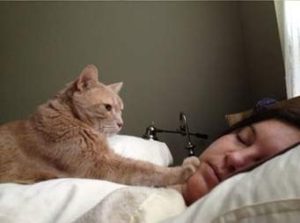
The word “hospice” comes from the Latin “hospes” meaning, “to host a guest or stranger.” The concept can be traced back to the year 1099, when Crusaders founded a “hospice” in Jerusalem for Christian pilgrims and Muslims alike. A Papal bull (charter) issued in 1113 christened the founding Crusaders the Knights Hospitaller and charged them to defend the hospice and care for ailing pilgrims visiting the Holy Land.
Over time, “hospice” came to refer to places of hospitality for the sick, wounded, dying, and travelers and pilgrims.
The modern concept of hospice, which includes palliative care, was pioneered in the 1950s. Palliate comes from the Latin “palliare,” meaning “to cloak,” as in cloaking pain without curing the underlying medical condition. Continue reading “Does your local animal shelter have a Hospice Program? by Ed Boks”




